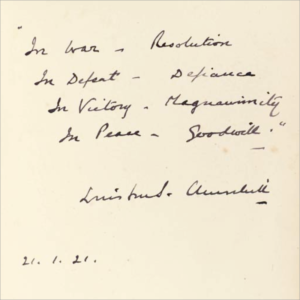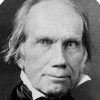Art, like morality, consists of drawing the line somewhere.
Gilbert Keith Chesterton (1874-1936) English journalist and writer
“Our Note Book,” Illustrated London News (5 May 1928)
Often misattributed to Oscar Wilde (and as "Morality, like art ..."). For more info, see here.
The wise old fairy tales never were so silly as to say that the prince and the princess lived peacefully ever afterwards. The fairy tales said that the prince and the princess lived happily, and so they did. They lived happily, although it is very likely that from time to time they threw the furniture at each other. Most marriages, I think, are happy marriages; but there is no such thing as a contented marriage. The whole pleasure of marriage is that it is a perpetual crisis.
CONJURER: Doctor, there are about a thousand reasons why I should not tell you how I really did that trick. But one will suffice, because it is the most practical of all.
DOCTOR: Well? And why shouldn’t you tell me?
CONJURER:”Because you wouldn’t believe me if I did.
I don’t believe in twisting yourself into knots of excuses and explanations over the food you make. When one’s hostess starts in with self-deprecations such as “Oh, I don’t know how to cook …,” or “Poor little me …,” or “This may taste awful …,” it is so dreadful to have to reassure her that everything is delicious and fine, whether it is or not. Besides, such admissions only draw attention to one’s shortcomings (or self-perceived shortcomings) and make the other person think, “Yes, you’re right, this really is an awful meal!” Maybe the cat has fallen into the stew, or the lettuce has frozen, or the cake has collapsed — eh bien, tant pis!
Julia Child (1912-2004) American chef and writer
My Life In France, “Le Cordon Bleu,” sec. 2 (2006)
(Source)
"Oh well, too bad."
The smart way to keep people passive and obedient is to strictly limit the spectrum of acceptable opinion, but allow very lively debate within that spectrum – even encourage the more critical and dissident views. That gives people the sense that there’s free thinking going on, while all the time the presuppositions of the system are being reinforced by the limits put on the range of the debate.
You meet a thousand times in life with those who, in dealing with any religious question, make at once their appeal to reason, and insist on forthwith rejecting aught that lies beyond its sphere — without, however, being able to render any clear account of the nature and proper limits of the knowledge thus derived, or of the relation in which such knowledge stands to the religious needs of men. I would invite you, therefore, to inquire seriously whether such persons are not really bowing down before an idol of the mind, which, while itself of very questionable worth, demands as much implicit faith from its worshipers as divine revelation itself.
Theodor Christlieb (1833-1889) German theologian
(Attributed)
Granting that you and I argue. If you get the better of me, and not I of you, are you necessarily right and I wrong? Or if I get the better of you and not you of me, am I necessarily right and you wrong? Or are we both partly right and partly wrong? Or are we both wholly right and wholly wrong? You and I cannot know this, and consequently we all live in darkness.
There is no such thing as a moral dress. It’s people who are moral or immoral.
If you’re going through hell, keep going.
Winston Churchill (1874-1965) British statesman and author
(Spurious)
Also sometimes given as "If you're going through hell, don't stop."Not found in any of Churchill's written works or directly attributed to him in any reliable source. See here for more information.
The inherent vice of capitalism is the unequal sharing of blessings. The inherent virtue of socialism is the equal sharing of miseries.
Winston Churchill (1874-1965) British statesman and author
Speech, House of Commons (22 Oct 1945)
(Source)
I am prepared to meet my Maker. Whether my Maker is prepared for the great ordeal of meeting me is another matter.
WOMAN: There are two things I don’t like about you, Mr. Churchill — your politics and your mustache.
CHURCHILL: My dear madam, pray do not disturb yourself. You are not likely to come into contact with either.
It is vain to imagine that the mere perception or declaration of right principles, whether in one country or in many countries, will be of any value unless they are supported by those qualities of civic virtue and manly courage
In War: Resolution.
In Defeat: Defiance.
In Victory: Magnanimity.
In Peace: Goodwill.Winston Churchill (1874-1965) British statesman and author
The Second World War, Vol. 1: The Gathering Storm, Epigram, “Moral of the Work,” (1948)
(Source)
The most famous use of the quote, though it can be found as far back as 21 Jan 1921 in Churchill's own hand, and Edward Marsh, his private secretary, suggested it dated back to just after WW I, as a possible war memorial.More information here: CHURCHILL, Sir Winston Spencer (1874-1965). Autograph sentiment signed and dated, 21 January 1921, 'In War - Resolution , In Defeat - Defiance , In Victory - Magnanimity , In Peace - Goodwill', one page, 4°, in a commonplace book further inscribed and signed 'To Nell from Winston S. Churchill 21.1.21', and with one other inscription, contemporary marbled calf, front cover panelled in gilt and blind. Provenance: Roy A. Dalton; and by descent..
But it’s no show just to protect the serious, the solemn, and the high-minded. We must protect the flippant, the zany, the heretical, and the downright queer. The Constitution gives every American the inalienable right to make a damn fool of himself.
Every evil in the bud is easily crushed: as it grows older, it becomes stronger.
[Omne malum nascens facile opprimitur; inveteratum fit pleurumque robustius.]
Marcus Tullius Cicero (106-43 BC) Roman orator, statesman, philosopher
Philippicae [Philippics], No. 5, ch. 11 / sec. 28 (5.28) (1 Jan AD 43)
(Source)
(Source (Latin)). Alternate translations:Every evil is easily crushed at its birth; when it has become of long standing, it usually gets stronger.
[tr. Yonge (1903)]Every evil is easily crushed at its birth; become inveterate it as a rule gathers strength.
[tr. Ker (1926)]
What is so advantageous to the people as liberty? which is sought out and preferred to everything, not only by men, but even by the beasts.
[Quid tam populare quam libertas? Quam non solum ab hominibus verum etiam a bestiis expeti atque omnibus rebus anteponi videtis.]
Marcus Tullius Cicero (106-43 BC) Roman orator, statesman, philosopher
De Lege Agraria [On the Agrarian Law], Oration 2 “Contra Rullum,” sec. 9 (63 BC) [tr. Yonge (1856)]
(Source)
(Source (Latin)). Alternate translation:What is so beneficial to the people as liberty, which we see not only to be greedily sought after by men, but also by beasts, and to be preferred to all things.
[Source (1884)]
If you pursue good with labor, the labor passes away but the good remains. If you pursue evil with pleasure, the pleasure passes away and the evil remains.
Marcus Tullius Cicero (106-43 BC) Roman orator, statesman, philosopher
(Attributed)
Widely attributed to Cicero, but no actual citations found. Sometimes the clauses are reversed:If you pursue evil with pleasure, the pleasure passes away and the evil remains. If you pursue good with labor, the labor passes away but the good remains.
For it is the part of a wise man to resolve beforehand that whatever can happen to a brave man is to be endured with patience if it should happen. It is indeed a proof of altogether greater wisdom to act with such foresight as to prevent any such thing from happening; but it is a token of no less courage to bear it bravely if it should befall one.
[Est enim sapientis, quidquid homini accidere possit, id praemeditari ferendum modice esse, si evenerit. Majoris omnino est consilii providere ne quid tale accidat, animi non minoris fortiter ferre si evenerit.]
Marcus Tullius Cicero (106-43 BC) Roman orator, statesman, philosopher
Philippics, No. 11, ch. 3 / sec. 7 (11.7) (late Feb AD 43) [tr. Yonge (1903)]
(Source)
(Source (Latin)). Alternate translations:For it is the part of a wise man to resolve beforehand that whatever can happen to a man should be borne calmly if it should befall him. It needs altogether great judgment to provide against such evil happening and no less courage to bear it with fortitude if it should befall.
[tr. Ker (1926)]It is the mark of a wise man ever to consider, reflect, that whatever may happen to him should be borne with patience. It is, however, a mark of greater wisdom to take every precaution against the occurrence of any thing unpleasant, of a reverse of fortune; but it is an indication of a mind in no wise inferior bravely and manfully to submit to any change of fortune, however unpleasant, untoward, unfavorable, unpropitious.
[Source]
This appears to the the source of the paraphrase: "To yield to occasion is the mark of a wise man."
The safety of the people is the supreme law.
[Salus populi suprema lex esto.]
Marcus Tullius Cicero (106-43 BC) Roman orator, statesman, philosopher
De Legibus [On the Laws], Book 3, ch. 3 / sec. 8 (3.3/3.8) [Marcus] (c. 51 BC) [tr. Barham (1842)]
(Source)
Cicero gives this in his outline of how government ought to be constituted, in particular how the consuls should have ultimate authority over the law and the army. (Source (Latin)). Alternate translations:The safety of the people shall be their highest law.
[tr. Keyes (1928)]The safety of the people shall be the highest law.
[tr. Rudd (1998)]For them let the safety of the people be the highest law.
[tr. Zetzel (1999)]Let the safety of the people be the highest law.
[tr. Fott (2013)]
Other, more general translations:The phrase (in Latin) was used frequently during the Enlightenment as a core statement around the purpose of government, most famously in John Locke's Second Treatise,, ch. 13, sec. 158.
- "The good of the people is the chief law."
- "Let the welfare of the people be the ultimate law."
More information about this quote and its uses: Salus populi suprema lex esto - Wikipedia
A room without books is like a body without a soul.
Marcus Tullius Cicero (106-43 BC) Roman orator, statesman, philosopher
(Paraphrase)
(Source)
This appears to be a paraphrase of:Since Tyrannio has arranged my books, the house seems to have acquired a soul.
[Postea vero quam Tyrannio mini libros disposuit, mens addita videtur meis aedibus.]
From Epistulae ad Atticum [Letters to Atticus], Book 4, Letter 8 (4.8) (Apr-May 56 BC) [tr. Winstedt (1912)].
The national budget must be balanced. The public debt must be reduced; the arrogance of the authorities must be moderated and controlled. Payments to foreign governments must be reduced, if the nation doesn’t want to go bankrupt. People must again learn to work, instead of living on public assistance.
Marcus Tullius Cicero (106-43 BC) Roman orator, statesman, philosopher
(Spurious)
(Source)
One of several related paraphrases of this "quote" from Taylor Caldwell's novel about Cicero, A Pillar of Iron, ch. 51 (1965):Antonius heartily agreed with him [sc. Cicero] that the budget should be balanced, that the Treasury should be refilled, that public debt should be reduced, that the arrogance of the generals should be tempered and controlled, that assistance to foreign lands should be curtailed lest Rome become bankrupt, that the mobs should be forced to work and not depend on government for subsistence, and that prudence and frugality should be put into practice as soon as possible.
See here and here for more discussion.
Peace indeed is both sweet in name and wholesome in reality; but there is all the difference in the world between peace and slavery. Peace is the calmness of freedom, slavery the worst of all evils, to be kept off at a the cost not only of war, but even of life itself.
[Et nomen pacis dulce est et ipsa res salutaris; sed inter pacem et servitutem plurimum interest. Pax est tranquilla libertas, servitus postremum malorum omnium, non modo bello sed morte etiam repellendum.]
Marcus Tullius Cicero (106-43 BC) Roman orator, statesman, philosopher
Philippicae [Philippics], No. 2, ch. 44 / sec. 113 (2.113) (24 October AD 44) [tr. King (1867)]
(Source)
(Source (Latin)). Alternate translations:The name of peace is sweet, the thing itself is most salutary. But between peace and slavery there is a wide difference. Peace is liberty in tranquillity; slavery is the worst of all evils, -- to be repelled, if need be, not only by war, but even by death. [tr. Yonge (1903)]And the name of peace is sweet, and the thing itself wholesome, but between peace and servitude the difference is great. Peace is tranquil liberty, servitude the last of all evils, one to be repelled, not only by war but even by death.
[tr. Ker (1926)]The name of peace is sweet, and the thing itself is beneficial, but there is a great difference between peace and servitude. Peace is freedom in tranquility, servitude is the worst of all evils, to be resisted not only by war, but even by death.
Each man must use his own judgement.
[Suo cuique iudicio est utendum.]
Marcus Tullius Cicero (106-43 BC) Roman orator, statesman, philosopher
De Natura Deorum, Book 3, ch. 1 [tr. Rackham (1933)]
(Source)
Somehow or other no statement is too absurd for some philosophers to make.
[Sed nescio quo modo nihil tam absurde dici potest quod non dicatur ab aliquo philosophorum.]
Marcus Tullius Cicero (106-43 BC) Roman orator, statesman, philosopher
De Divinatione [On Divination], Book 2, ch. 58 (2.58) / sec. 119 (45 BC) [tr. Falconer (1923)]
(Source)
Everybody knows that the first law of history is not daring to say anything false; that the second is daring to say everything that is true; that there should be no suggestion of partiality, none of animosity when you write.
[Nam quis nescit primam esse historiae legem, ne quid falsi dicere audeat? Deinde ne quid veri non audeat? Ne quae suspicio gratiae sit in scribendo? Ne quae simultatis?]
Marcus Tullius Cicero (106-43 BC) Roman orator, statesman, philosopher
De Oratore [On the Orator, On Oratory], Book 2, ch. 15 (2.15) / sec. 62 (55 BC) [tr. May/Wisse (2001)]
(Source)
(Source (Latin)). Alternate translations:For, is there a Man ignorant, that the first Rule of History is, that an Historian shall not dare to advance a Falsity; the next, that there is no Truth but what he shall dare to tell? That in Writing, he shall be free of all Prepossession; of all Pique?
[tr. Guthrie (1755)]For, is there a man ignorant that the first rule of history is that an historian shall not dare to advance a falsehood; the next, that there no truth but what he shall dare to tell? That the writer should be actuated neither by favour, or by prejudice?
[Source (1808)]For who is ignorant that it is the first law in writing history, that the historian must not dare to tell any falsehood, and the next, that he must be bold enough to tell the whole truth? Also, that there must be no suspicion of partiality in his writings, or of personal animosity?
[tr. Watson (1860)]Who need be informed that the first law of history is, to have the honesty to state no falsehood, the next, the courage to suppress no truth, and to avoid all suspicion of undue bias or personal animosity?
[tr. Calvert (1870)]Who does not recognise that the first law of history is that we shall never dare to say what is false; the second that we shall never fear to say what is true; that everything we write shall be free from any suspicion of favoritism or flattery?
[ed. Harbottle (1906)]For who does not know history's first law to be that an author must not dare to tell anything but the truth ? And its second that he must make bold to tell the whole truth? That there must be no suggestion of partiality anywhere in his writings? Nor of malice?
[tr. Sutton/Rackham (1940)]The first law for the historian is that he shall never dare utter an untruth. The second is that he shall suppress nothing that is true. Moreover, there shall be no suspicion of partiality in his writing, or of malice.
[Bartlett's]
Thus in all things the greatest pleasures are only narrowly separated from disgust.
[Sic omnibus in rebus, voluptatibus maximis fastidium finitimum est.]
Marcus Tullius Cicero (106-43 BC) Roman orator, statesman, philosopher
De Oratore [On the Orator, On Oratory], Book 3, ch. 25 (3.25) / sec. 100 (55 BC) [tr. Rackham (1942)]
(Source)
(Source (Latin)). Alternate translations:Thus, generally speaking, Loathing borders upon the most pleasing Sensations.
[tr. Guthrie (1755)]Thus, generally speaking, satiety borders upon the most pleasing sensations.
[Source (1808)]In all other things, loathing still borders upon the most exquisite delights.
[tr. Watson (1860)]The extremes of gratification and disgust are separated by the finest line of demarcation.
[tr. Calvert (1870)]In everything we do, all our keenest pleasures end in satiety.
[ed. Harbottle (1906)]In everything else, then, the greatest pleasure borders on aversion.
[tr. May/Wisse (2001)]
Among Christians so much prominence has been given to the disciplinary effects of sorrow, affliction, bereavement, that they have been in danger of overlooking the other and more obvious side: that by every joy, by every favor, by every sign of prosperity
Francis Edward Clark (1851-1927) American clergyman
(Attributed)
For he that makes any thing his chiefest good, wherein justice or virtue does not bear a part, and sets up profit, not honesty, for the measure of his happiness; as long as he acts in conformity with his own principles, and is not overruled by the mere dictates of reason and humanity, can never do the offices of friendship, justice, or liberality: nor can he ever be a man of courage, who thinks that pain is the greatest evil; or he of temperance, who imagines pleasure to be the sovereign good.
[Nam qui summum bonum sic instituit, ut nihil habeat cum virtute coniunctum, idque suis commodis, non honestate metitur, hic, si sibi ipse consentiat et non interdum naturae bonitate vincatur neque amicitiam colere possit nec iustitiam nec liberalitatem; fortis vero dolorem summum malum iudicans aut temperans voluptatem summum bonum statuens esse certe nullo modo potest.]
Marcus Tullius Cicero (106-43 BC) Roman orator, statesman, philosopher
De Officiis [On Duties; On Moral Duty; The Offices], Book 1, ch. 2 (1.2) / sec. 5 (44 BC) [tr. Cockman (1699)]
(Source)
Attacking the Epicurean "highest good" of avoiding pain and seeking personal detachment; Cicero supported the Stoic virtues of courage and moderation.
(Source (Latin)). Alternate translations:He who teaches that to be the chief good which hath no connection with virtue, which is measured by personal advantage, and not by honor; if he be consistent with himself, and not sometimes overcome by the benignity of nature, can neither cultivate friendship nor practice justice nor liberality. That man cannot be brave who believes pain the greatest evil; nor temperate, who believes pleasure the supreme good.
[tr. McCartney (1798)]For if a man should lay down as the chief good, that which has no connexion with virtue, and measure it by his own interests, and not according to its moral merit; if such a man shall act consistently with his own principles, and is not sometimes influenced by the good ness of his heart, he can cultivate neither friendship, justice, nor generosity. In truth, it is impossible for the man to be brave who shall pronounce pain to be the greatest evil, or temperate who shall propose pleasure as the highest good.
[tr. Edmonds (1865)]For he who so interprets the supreme good as to disjoin it from virtue, and measures it by his own convenience, and not by the standard of right, -- he, I say, if he be consistent with himself, and be not sometimes overcome by natural goodness, can cultivate neither friendship, nor justice, nor generosity; nor can he possibly be brave while he esteems pain as the greatest of evils, or temperate while he regards pleasure as the supreme good.
[tr. Peabody (1883)]He who severs the highest good from virtue and measures it by interest and not by honour, if he were true to his principles and did not at times yield to his better nature, could not cultivate friendship, justice or liberality; and no one can be brave who declares pain the greatest evil, or temperate who maintains pleasure to be the highest good.
[tr. Gardiner (1899)]For he who posits the supreme good as having no connection with virtue and measures it not by a moral standard but by his own interests -- if he should be consistent and not rather at times over-ruled by his better nature, he could value neither friendship nor justice nor generosity; and brave he surely cannot possibly be that counts pain the supreme evil, nor temperate he that holds pleasure to be the supreme good.
[tr. Miller (1913)]Take, for example, the man who has established the kind of highest good that has nothing to do with virtue, that is, measured by the individual's convenience, not by his morality. If that man is consistent and is not in the meantime overcome by natural goodness, he cannot cultivate friendship, or justice, or openness of character. In fact, a man of courage who considers pain the greatest evil, or a temperate man who declares indulgence to be the greatest good, is surely an impossible contradiction.
[tr. Edinger (1974)]No man can be brave who thinks pain the greatest evil; nor temperate, who considers pleasure the highest good.
[Source]
We find comfort among those who agree with us — growth among those who don’t.
Frank A. Clark (1911-1991) American writer
(Attributed)
When a distinguished but elderly scientist states that something is possible, he is almost certainly right. When he states that something is impossible, he is very probably wrong.
The thing about change is that it’s not permanent.
Tracy Clavin (contemp.) American educator
(Attributed)
The dumber people think you are, the more surprised they’re going to be when you kill them.
William Clayton (contemp.)
(Attributed)
You’re either part of the solution or part of the problem.
Leroy Eldridge Cleaver (1935-1998) American activist
Speech (1968)
The great mistake most people make is the assumption that most people are sane. I know very few people who are sane — and only one man in my life who was really grown up. All the other people are terribly recognizable as kids who have learned grown-up ways of behaving.
If a man, holding a belief which he was taught in childhood or persuaded of afterwards, keeps down and pushes away any doubts which arise about it in his mind, purposely avoids the reading of books and the company of men that call in question and discuss it, and regards as impious those questions which cannot easily be asked without disturbing it — the life of that man is one long sin against mankind.
William Kingdon Clifford (1845-1879) English mathematician and philosopher
“The Ethics of Belief,” Part 1 “The Duty of Inquiry,” Contemporary Review (Jan 1877)
(Source)
There is nothing wrong with America that cannot be cured with what is right in America.
William Jefferson "Bill" Clinton (b. 1946) American politician, US President (1993-2001)
First Inaugural Address (20 Jan. 1993)
The last time I checked, the Constitution said, “of the people, by the people and for the people.” That’s what the Declaration of Independence says.
We must believe in luck. For how else can we explain the success of those we don’t like?
Moralism is historically one of America’s great defects. Moralism is intolerant of ambiguity; it perceives reality in extreme terms of good and evil and regards more sophisticated judgments as soft and unworthy. The temptation to moralize is strong; it is emotionally satisfying to have enemies rather than problems, to seek out culprits rather than flaws in the system. God knows it is emotionally satisfying to be righteous with that righteousness that nourishes itself on the blood of sinners. But God also knows that what is emotionally satisfying can be spiritually devastating.
Clearly it is not Scripture that creates hostility to homosexuality, but rather hostility to homosexuality that prompts certain Christians to retain a few passages from an otherwise discarded law code. The problem is not how to reconcile homosexuality with scriptural passages, but rather how to reconcile the rejection and punishment of homosexuals with the love of Christ.
William Sloane Coffin, Jr. (1924-2006) American minister, social activist
The Courage to Love, ch. 5 (1982)
(Source)
Tolerance implies a respect for another person, not because he is wrong or even because he is right, but because he is human.
John Cogley (1916-1976) American religion journalist, editor
Commonweal, column
You don’t drown by falling in the water; you drown by staying there.
Edwin L. Cole (1922-2002) American minister and writer
(Attributed)
quoted in Don
He prayeth well, who loveth well
Both man and bird and beast.
He prayeth best, who loveth best
All things both great and small;
For the dear God who loveth us,
He made and loveth all.






















